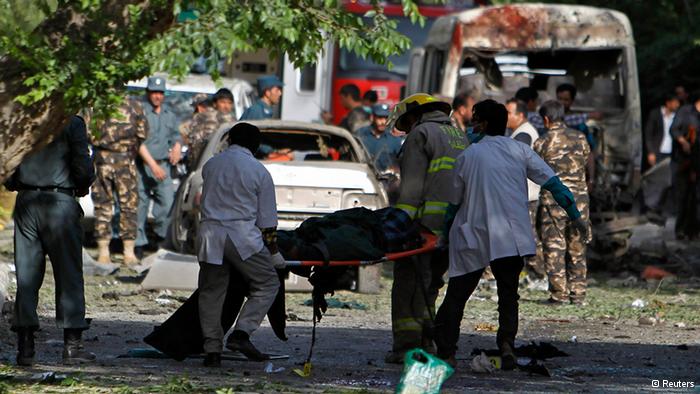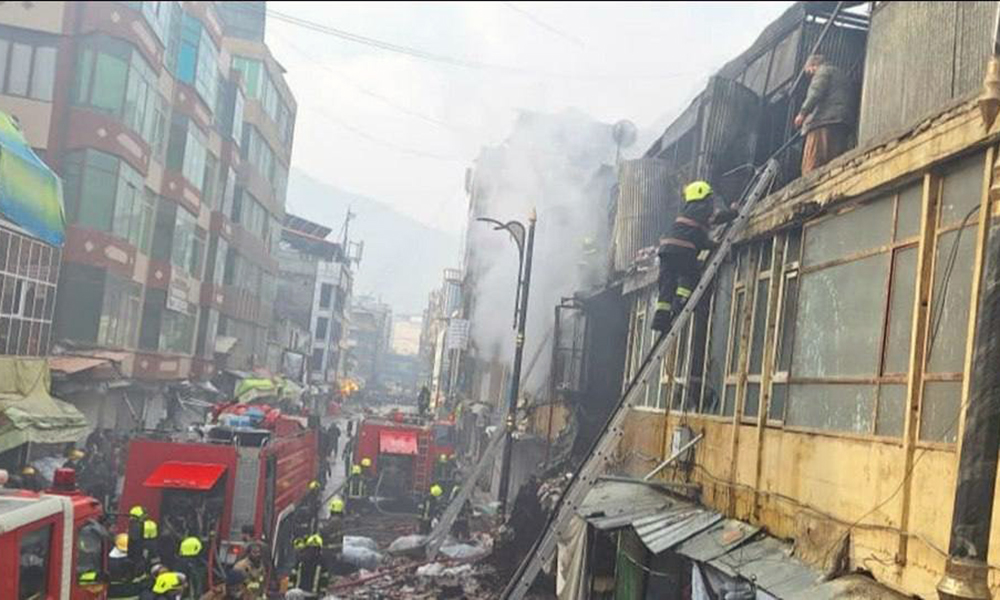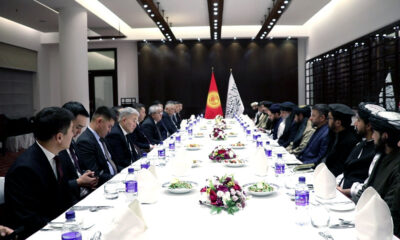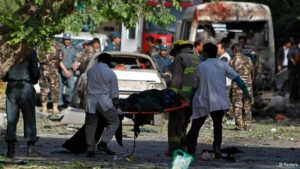Latest News
UN Counts High Record Number of Civilian Casualties in Afghanistan in 2018

The United Nations new report reveals that more civilians were killed in the Afghan conflict last year than at any time since records have been kept, the UNAMA and UN Human Rights Office said.
According to the report which was released by the UN Assistance Mission in Afghanistan (UNAMA) and the UN Human Rights Office on Sunday 3,804 civilians have lost their lives. Among the dead were 927 children, the highest recorded number of boys and girls killed in the conflict during a single year.
In total, UNAMA documented 10,993 civilian casualties (3,804 deaths and 7,189 injured), representing a five percent increase in overall civilian casualties and an 11 percent increase in civilian deaths compared to 2017.
UNAMA attributed the majority of civilian casualties 63% to anti-Government Elements (AGEs), 37% to Taliban, 20% to Daesh, and 6% to undetermined AGEs. Pro-Government Forces caused 24% of civilian casualties –14% by Afghan National Security Forces, 6% by the international military forces, as well as 4% by other pro-government armed groups and forces.
Key factors contributing to the significant increase in civilian casualties were a spike in suicide attacks by AGEs, mainly Daesh, as well as increased harm to civilians from aerial and search operations by pro-government forces. 2018 witnessed the highest number of civilian casualties ever recorded from suicide attacks and aerial operations.
“The report’s rigorously researched findings show that the level of harm and suffering inflicted on civilians in Afghanistan is deeply disturbing and wholly unacceptable,” UNAMA Chief Tadamichi Yamamoto said.
He added, “All parties need to take immediate and additional concrete steps to stop a further escalation in the number of civilians harmed and lives destroyed.”
Yamamoto said, “This is the UN’s tenth annual report documenting the plight of civilians in the Afghan conflict –more than 32,000 civilians killed and around 60,000 injured in a decade. It is time to put an end to this human misery and tragedy. The best way to halt the killings and maiming of civilians is to stop the fighting. That is why there is all the more need now to use all our efforts to bring about peace. I urge all parties to seize every opportunity to do so.”
“The conflict in Afghanistan continues to kill far too many civilians and has caused long-lasting suffering, both physical and psychological, to countless others,” the UN High Commissioner for Human Rights Michelle Bachelet said.
“The fact that the number of children killed this year is the highest on record, is particularly shocking. In addition to the lives lost, the dire security situation is preventing many Afghans from enjoying their economic, social and cultural rights, with thousands of children already handicapped for life because of attacks on schools and medical facilities,” Bachelet added.
“So I call on all parties to the conflict to fully respect international humanitarian and international human rights law to protect the lives of all civilians,” Bachelet underlined.
Anti-Government Elements were responsible for 6,980 civilian casualties (2,243 deaths and 4,737 injured), a 3% increase on 2017, which mainly resulted from the indiscriminate use of suicide improvised explosive devices (IEDs) and the deliberate targeting of civilians with these devices. Taliban caused 4,072 civilian casualties (1,348 deaths and 2,724 injured), 7% down on 2017, while Daesh caused 2,181 civilian casualties (681 deaths and 1,500 injured), an increase of 118%.
UNAMA attributed a further 678 civilian casualties (196 deaths and 482 injured) to undetermined AGEs.
Anti-government elements’ use of IEDs in both suicide and non-suicide attacks reached extreme levels and remained the leading cause of civilian casualties in 2018, accounting for 42 percent of the total. Suicide IED attacks caused 2,809 civilian casualties (886 deaths and 1,923 injured), almost 26% of all civilian casualties, while non-suicide IEDs caused more than 16%, resulting in a combined total of 4,627 civilian casualties (1,361 deaths and 3,266 injured).
UNAMA notes continued concern with the Taliban’s use of indirect weapons systems and IEDs, particularly targeting civilians and civilian objects during election-related attacks, as well as using the weapons against pro-government forces in civilian areas, which has indiscriminate effects. The increase in deliberate targeting of civilians by the Taliban, which nearly doubled from 865 civilian casualties in 2017 to 1,688 in 2018, resulted largely from the 27 January suicide ambulance attack in Kabul (the deadliest single incident ever recorded by UNAMA) and from election-related attacks on the 20 October polling day, when UNAMA recorded the highest number of civilian casualties in any single day in 2018. Civilian casualties resulting from deliberate targeting of civilians by Daesh, which included attacks against the Shi’a Muslim population, more than doubled.
Anti-government elements carried out 65 suicide and complex attacks in 2018. UNAMA attributed 21 of the attacks to the Taliban, which caused 642 civilian casualties. Taliban claimed responsibility for 15 of these attacks, from which UNAMA verified 542 civilian casualties. UNAMA attributed 36 suicide and complex attacks to Daesh, causing 1,892 civilian casualties. The group claimed responsibility for 33 of these incidents, which caused 1,631 civilian casualties. Seven incidents claimed by Daesh caused more than 100 civilian casualties as compared to three in 2017.
UNAMA documented disproportionate and extreme harm to Kabul residents from suicide and complex attacks. Almost half of the AGE suicide and complex attacks in 2018 occurred in Kabul, with 28 such incidents causing 1,686 civilian casualties (481 deaths and 1,150 injuries), a 5% increase in the number of casualties from 2017.
UNAMA documented a 24% increase in civilian casualties attributed to Pro-Government Forces in 2018 as compared to 2017, which mainly resulted from aerial operations by international military forces, as well as from search operations conducted by Afghan national security forces and pro-government armed groups. Between 1 January and 31 December 2018, UNAMA documented 2,612 civilian casualties (1,185 deaths and 1,427 injured) from operations conducted by Pro-Government Forces. Civilian casualties attributed to Pro-Government Forces accounted for 24% of all civilian casualties in Afghanistan in 2018.
For the first time since 2009 when it began systematically documenting civilian casualty figures, UNAMA recorded more than 1,000 civilian casualties from aerial operations. 2018 also witnessed more than 500 civilians killed by aerial operations for the first time on record. UNAMA documented 1,015 civilian casualties (536 deaths and 479 injured) from aerial operations. Of these, UNAMA attributed responsibility to international military forces for 632 civilian casualties (393 deaths and 239 injured), to the Afghan Air Force for 304 civilian casualties (118 deaths and 186 injured) and the remaining casualties to unidentified pro-Government forces.
Search operations caused 353 civilian casualties (284 deaths and 69 injured) with the majority caused by National Directorate of Security Special Forces and the Khost Protection Force, both of whom are supported by international military forces.
In 2018, approximately the same number of civilians were killed from airstrikes as in 2014, 2015 and 2016 combined. Women and children continued to comprise almost two-thirds of all civilian casualties from aerial operations, amounting to 648 civilian causalities (320 deaths and 328 injured).
In 2018, international military forces were responsible for 674 civilian casualties (406 deaths and 268 injured), 94% of which resulted from aerial operations.
Aerial operations and ground engagements caused the same number of civilian casualties, tied as the two leading causes of civilian casualties attributed to Pro-Government Forces in 2018.
The armed conflict continues to have a severe impact on children and women, who made up 38% of all civilian casualties. Child casualties represented 28 percent of all killed and injured. UNAMA recorded 3,062 child casualties (927 deaths and 2,135 injured). While this was a slight decrease compared to 2017, child deaths reached record high levels in 2018, mainly due to the more than doubling of child deaths from aerial operations, as well as an increase in child deaths from suicide attacks.
Anti-Government Elements caused 1,343 child casualties (324 deaths and 1,019 injured), comprising 44% of all child casualties in 2018. Pro-Government Forces caused 1,051 child casualties (414 deaths and 637 injured), comprising 34% of overall child casualties.
Overall child casualty figures showed AGEs continued to cause most child casualties in 2018, although it decreased by 3% compared to 2017, while there was a 15% increase in child casualties attributed to Pro-Government Forces. UNAMA documented that Pro-Government Forces were responsible for the deaths of 414 children in 2018, while Anti-Government Elements were responsible for the deaths of 324 children in 2018.
Women casualties reduced by six percent to 1,152 (350 deaths and 802 injured), resulting mainly from the eight percent decrease in women casualties from ground engagements. Women comprised 10 percent of conflict-related civilian casualties in 2018.
In the report, UNAMA acknowledges the efforts taken by the Afghan national security forces, international military forces, and the Taliban to protect civilians from harm caused. However, given the scale and scope of civilian casualties that have continued at very high levels for years, it emphasizes that more needs to be done.
Among its recommendations, the report urges Anti-Government Elements to cease the deliberate targeting of civilians and civilian objects, as well as the indiscriminate and disproportionate use of all IEDs. It calls on the Government of Afghanistan and international military forces to strengthen their review of incidents involving allegations of civilian casualties and ensure that effective reparations are provided for harm suffered. Beyond this, a halt in the fighting by all parties is the only effective way to protect civilians.
At the meantime, the Taliban in a statement have rejected the UNAMA’s report as allegedly 37% of civilian casualties are caused by the Taliban militants.
Latest News
Afghanistan signs 30-year deal for marble mining in Daikundi

The Ministry of Mines and Petroleum of Afghanistan has signed a 30-year agreement with a private company to extract marble in Daikundi province.
Under the contract, the company will invest AFN 283 million in exploring and mining marble at the “Mesh-Uliya” site, spanning 16.74 square kilometers in central Daikundi.
Hedayatullah Badri, Minister of Mines and Petroleum, stated that the marble will be processed domestically before being exported abroad. He added that the Mesh-Uliya project is expected to create around 200 jobs, and the company is committed to supporting local communities through social initiatives.
Economic experts highlight that such investments, especially those focusing on domestic processing, are crucial for job creation, boosting exports, and strengthening the national economy. Analysts further note that the project will improve local infrastructure, expand social services, and enhance the economic and social well-being of Daikundi residents.
Since the return of the Islamic Emirate to power, efforts to develop Afghanistan’s mining sector have intensified, with multiple contracts signed in areas including cement, copper, iron, and lapis lazuli, involving both domestic and international companies.
Latest News
Passenger bus veers off Salang Highway, leaving 5 dead, dozens injured
Latest News
Major fire in Mandawi Kabul market contained, extensive losses prevented
Local shopkeepers said the fire broke out around 4 a.m.

The Ministry of Interior reported that personnel from the General Directorate of Firefighting and Emergency Response successfully prevented the further spread of a fire at Mandawi market on Kabul early Sunday morning.
Abdul Mateen Qani, spokesperson for the ministry, said that the fire destroyed 10 storage facilities and 8 shops. He added that initial losses are estimated at around $700,000, but timely action by firefighting personnel saved property worth approximately $2.2 million.
Qani explained that the fire was caused by an electrical short circuit. He praised the rapid and effective containment operations, which prevented more extensive damage.
Local shopkeepers said the fire broke out around 4 a.m.
-

 International Sports5 days ago
International Sports5 days agoIPL 2026: Teams take shape after auction as franchises balance star power and depth
-

 International Sports4 days ago
International Sports4 days agoILT20: Abu Dhabi Knight Riders end Desert Vipers’ unbeaten run in dramatic one-run win
-

 Latest News2 days ago
Latest News2 days agoAfghan border forces prevent illegal entry of hundreds into Iran
-

 Regional5 days ago
Regional5 days agoPakistan’s military chief Asim Munir in spotlight over Trump’s Gaza plan
-

 Latest News2 days ago
Latest News2 days agoPakistan summons Afghan diplomat over deadly attack in North Waziristan
-

 Business4 days ago
Business4 days agoMahirood Customs leads Iran’s exports to Afghanistan
-

 World5 days ago
World5 days agoTrump adds seven countries, including Syria, to full travel ban list
-

 Latest News4 days ago
Latest News4 days agoAfghanistan, Kyrgyzstan discuss expanding trade and economic cooperation


























